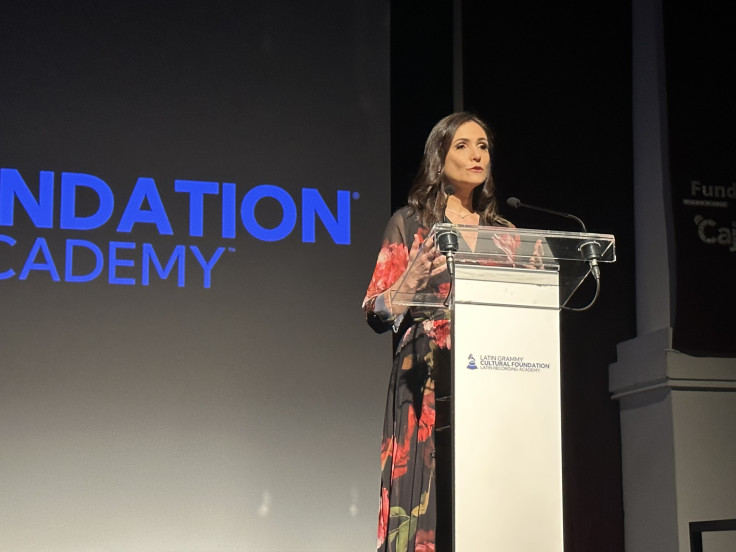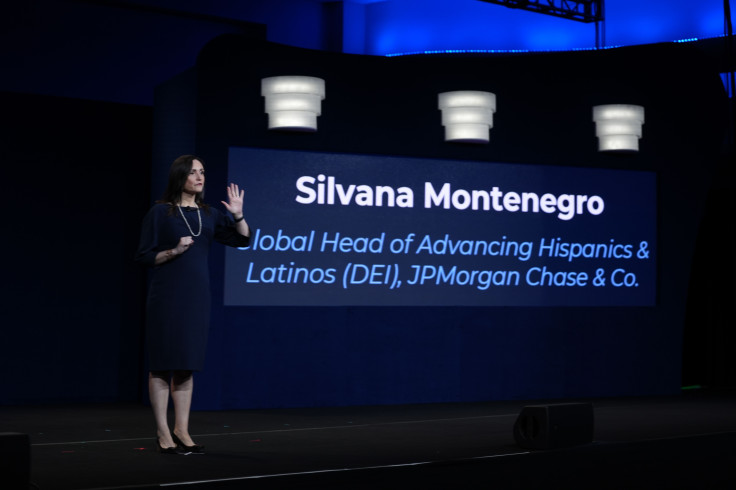
Financial education, curated messaging and backing entrepreneurs with resources and structure. These are some of the pillars Silvana Montenegro seeks to strengthen in her role as JPMorgan Chase's Global Head of Advancing Hispanics & Latinos.
In an interview with The Latin Times, Montenegro explained the different areas of her work, outlined the relevance of the different programs JPMorgan implements to best reach Latinos and analyzed other, more intangible aspects that play a role in their professional development and whose awareness could be key to accelerate it.
Montenegro said that financial education is a key priority for her team: "We don't talk about money at the dinner table. At the moment, 30 percent of Latinos in the U.S. are either unbanked or underbanked. Without basic financial education it's hard to create wealth for oneself and to pass it on to others," she said.
She added that JPMorgan has made a $30 billion commitment by the end of 2025 "to drive an inclusive recovery, support employees and break down systemic barriers." Advancing homeownership and access to affordable housing, are parts of this initiative.
A salient challenge when it comes to financial education lies in the messaging and conveying it to different audiences. To address this, Montenegro said, the company works to curate the content part of its different initiatives.
She mentioned as an example a collaboration with the Latin Grammys Cultural Foundation, where JPMorgan held financial workshops for students and partnered with influencers and professionals to talk about their journeys in this area. She also emphasized on the importance they later pass on this knowledge to their parents.
The company not only seeks to tailor its message based on age, but also geographic location and the different cultural nuances communities might have, as Latinos already represent almost 20 percent of the U.S. population and come from numerous backgrounds and countries.

In this context, Montenegro explained that JPMorgan's "wealth summits" are "curated events where we go to specific communities and hold an event with different workshops." "Influencers, celebrities and experts give courses on financial health, on how to build a business. We also provide them with opportunities to connect with bankers, have one-on-one coaching sessions and connect them with resources," she detailed.
As for cultural nuances, Montenegro said that JPMorgan's leadership focus on researching communities before engaging with them: "We don't go there without being at lockstep with them. We tailor the content based on what we anticipate. Maybe it's an area with more business owners," she said.
As an example, she recalled that an event in Miami featured the owner of ice cream company Azucar, given that "people know and appreciate her."
Entrepreneurs are another group Montenegro's office has focused on, especially through a partnership with the Latino Business Action Network. Earlier this year, JPMorgan became a corporate sponsor of this program, which helps Latino founders in three key areas: exploring challenges and opportunities, aiming to inform and influence policies; developing professional networks with fellow entrepreneurs, mentors, capital providers and partners, and scaling their companies.
"Latinos are the demographic that creates businesses faster than any other, but we tend to stagnate more. That's why the program was created for businesses who are willing to scale but may be stuck around the $1 million revenue mark," Montenegro explained.
"We not only sponsor a cohort of businesses but also bring in our expertise throughout the program. As a bank, we have experts that can advise on how to create a business, how to grow a business, how to get capital. Bringing that JPMorgan Chase ecosystem, we're really impacting those businesses in a more meaningful way than it would be otherwise if we were not collaborating," she added in an interview with Minority Business Review.
Montenegro highlighted this initiative given its potential to help Latinos in areas such as tech, where the demographic has tended to create fewer businesses. Asked about why she believed this might be the case, she pointed to circumstances on the ground for those migrants arriving in the country: "There might not be many opportunities so they create their own businesses. Construction might be an easier entry than others," she detailed.
However, Montenegro highlighted that there are "a lot of preconceptions about what Latinos can do and where they can do so," and that is one of the main reasons why she felt so strongly about the LBAN program. "We are resilient and we'll get anything done. Trends are beginning to change and will continue to do so," she said.
Montenegro concluded by saying that another significant barrier is more intangible and has to do with self-imposed limitations: We can be our worst enemies," she said, explaining that many Latinos might think that "if you work hard and put your head down you will be noticed," but that might not be the case many times.
"We need to use our voice. Putting our head down and working won't take us as far as we can. We can't be afraid. What makes us different is what makes us strong," Montenegro concluded.
© 2025 Latin Times. All rights reserved. Do not reproduce without permission.






